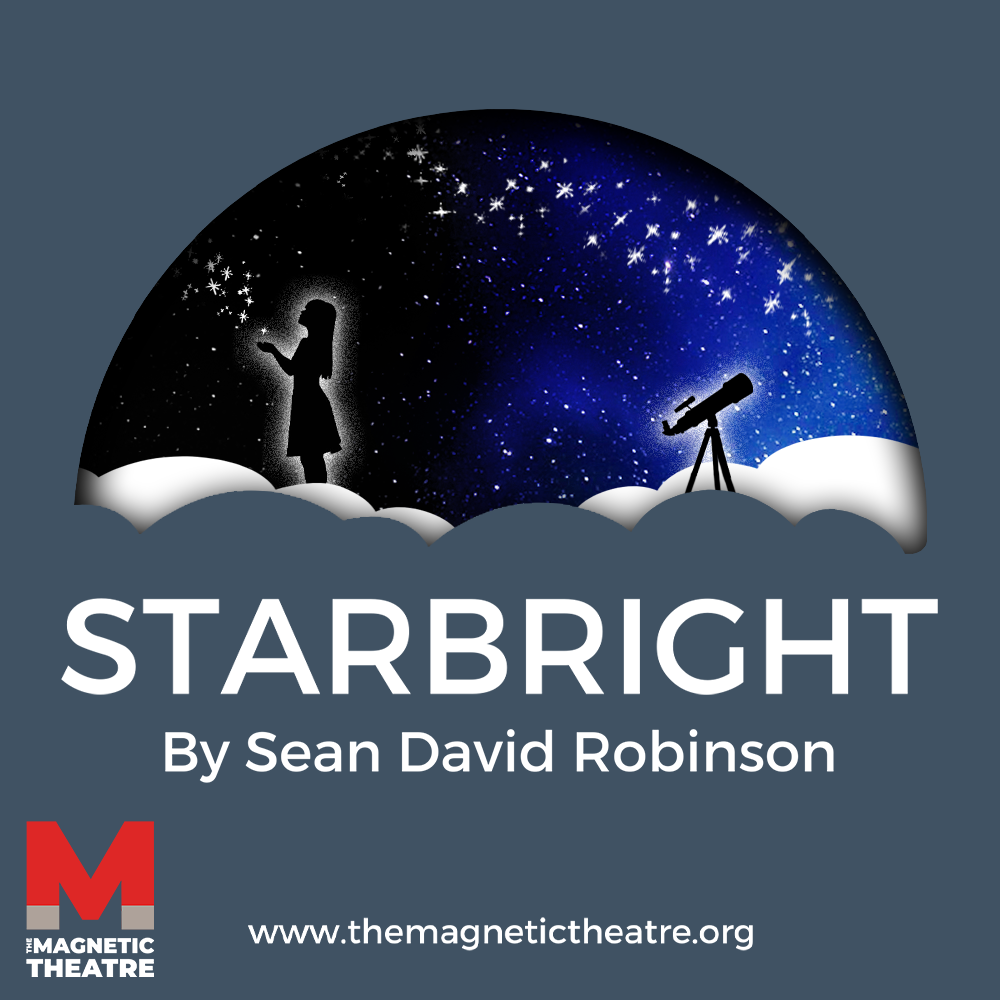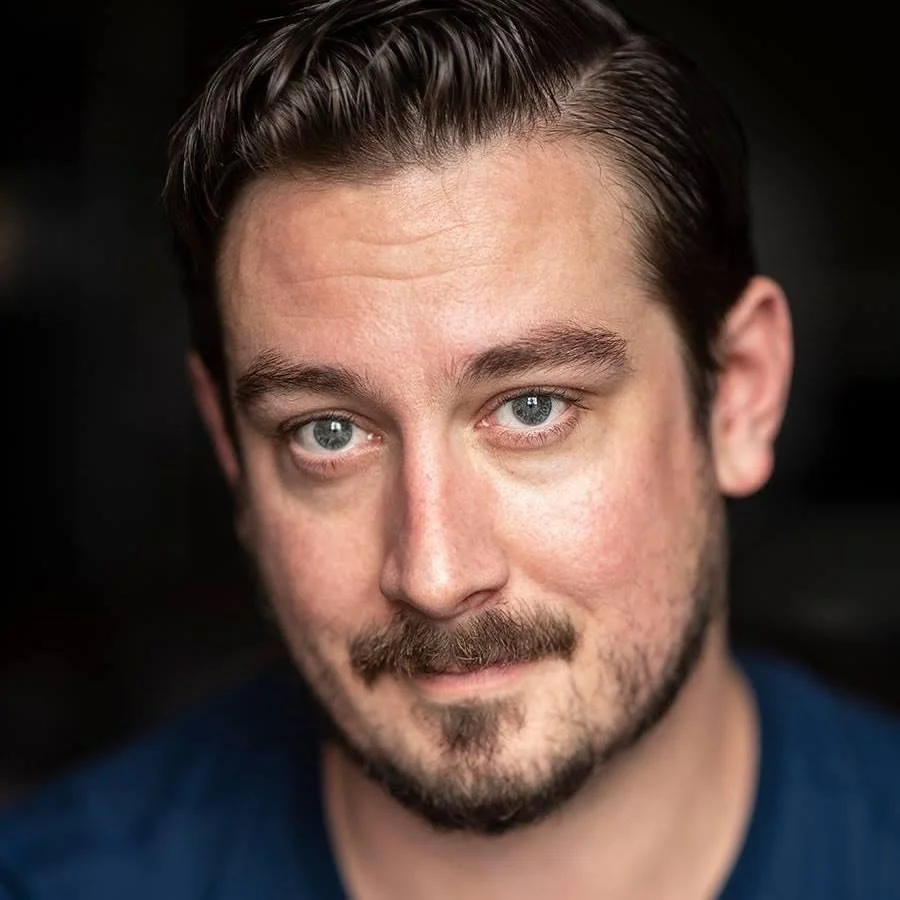Starbright is showing at The Magnetic Theatre in Asheville, NC July 8-23, 2022!
Grace, an astronomer with a Ph.D. in astrophysics, is reeling from the death of her daughter, Abigail. When Abigail appears to Grace and begins to make predictions about events in the cosmos, Grace must choose between her memories and her sanity.
We reached out to playwright Sean David Robinson with a few questions.
1. What inspired you to write this play?
I started working on Starbright because I wanted to write something for the stage that fused science-fiction concepts with the traditional family drama. Those are the kinds of plays I’d pay to go see, and they just don’t really exist.
I also wanted to write a character who exists at the crossroads of reason and belief, two forces which have pulled me in opposite directions throughout my life. I believe that’s a universal human gray area that we often shy away from exploring in depth.
And I wanted to write a play with a massive role for a female lead, something smart, something challenging, something which could be a tour de force for the right actress. There are so many plays that fit that description for male leads, and too few for women.
And finally, specifically, the character Grace was inspired by my wife, who is the smartest person I know, but also the most caring and empathic. She originated the role, edited the play, and her insight has been instrumental in its success.
2. Any advice you’d like to give to aspiring playwrights?
Yes. Probably too many, but here are the greatest hits:
The structure of a great play is simple: a character with a desperate need and a massive obstacle (or several) in the way. Sorkin calls it Intention vs Obstacle. The character sets out with an intention (a need), and has to face their obstacles in order to obtain it. It works on a global level, a scene level, and a line level. If you can’t figure out what a character wants, the scene isn’t working. Every character word or action should be in pursuit of that goal in some way or another.
Great characters are active. Passive characters put the audience to sleep. Your main character should go on a journey of their own making, not sit back and have things happen to them.
Go to coffee shops, bars, restaurants, parks, anywhere public, and listen. Write down word-for-word the weird way people talk. Learning how to write natural human speaking diction is a process best done by immersion. Study them in the wild and integrate those non-grammatical patterns into your writing.
Read as much as you can. Read plays before you see them, then read them again after. Dissect the text. Be merciless (privately, of course). Figure out what works, and what doesn’t. There’s no such thing as a perfect play. Even the masters make mistakes. Don’t just watch for entertainment. Ask yourself what those published, revered, award-winning plays could have done better. (Hint: It often comes down to the intention vs obstacle question.)
Read books on playwriting craft. This is so, so, so important. You must know the rules so you can break them. The beauty is, once you do, you’ll realize they aren’t rules at all. They’re tools. Tools you use to make the audience believe you, to care about your story, to crave the next scene rather than dread coming back from intermission. Put these tools in your tool belt. Wield them like swords.
If you’re looking for a good place to start learning the craft of playwriting, I highly recommend watching Aaron Sorkin’s Masterclass and reading the book Playwriting Seminars 2.0. These transformed me as a writer. To me, this is essential reading/viewing for anyone trying to make a go as a playwright.
3. Are there themes you feel drawn to write about? Why?
Unsolvable questions. That’s what draws me. Death, God, the multiverse, simulation theory, the age of the universe, the existence of non-human intelligent life. To me, the cross-section of what we know for certain and what is impossibly out of reach is teeming with potential untold stories.
4. Who are some playwrights that have inspired you?
Paula Vogel, Marsha Norman, David Mamet, Aaron Sorkin, Martin McDonough. These folks know the power of an emotional need driving a character to pursue a goal no matter the odds or opposition. They are masters of dialogue and tension, and are visionary storytellers to boot.
5. Tell us a bit about the success of Starbright.
Starbright premiered Off Broadway in a 2018 festival, then went on to win the North Carolina New Play Project, the Centre Stage New Play Festival, and was shortlisted for the Garry Marshall Theatre’s New Works Festival.
6. Do you have any upcoming projects that we should check out?
Since finishing Starbright, I’ve turned my attention to writing my debut novel, Beyond the Overcast Sky. That work is already garnering major attention, having placed 3rd in the international Gutsy Great Novelist First Chapter Contest earlier this year, and I’m now in talks with a top-ten international literary agency for representation.
Biography
Sean David Robinson is an author and playwright from Asheville, North Carolina. As a writer of speculative fiction, he enjoys exploring the intersection of the scientific and the mythical, finding kinship with characters who toil between the boundaries of logic and hope.
STARBRIGHT, his debut stage play, premiered in an Off Broadway Festival in 2018. It was chosen as the winner of the 2018 North Carolina New Play Project, and voted the winner of the 2018 Centre Stage New Play Festival in Greenville, South Carolina. It was also shortlisted as a semi-finalist for the inaugural New Works Festival at the Garry Marshall Theatre in Burbank, California.
BEYOND THE OVERCAST SKY, his debut novel, placed 3rd in the Gutsy Great Novelist First Chapter Contest in March 2022. He lives in Asheville with his brilliant wife and three mischievous cats. You can find him at @SDR_Writer on Twitter.
Grab your tickets to Starbright here: https://app.arts-people.com/index.php?show=132323


